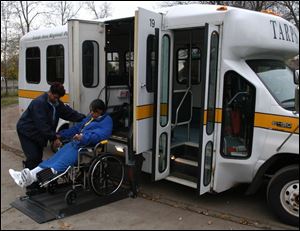
TARPS bus service for disabled riders drives for solutions
10/22/2008
The TARPS paratransit staff is working to improve service.
Imagine a computer system for scheduling on-demand bus trips is programmed to assume that each passenger needs one minute to board, or five minutes for wheelchair users.
To avoid conflicts, the system won t schedule another passenger to board at the same time. So when four people from the same household book rides together to the same place, what does the computer do?
It schedules four separate buses, one for each of them.
Until recently, that s what the Toledo Area Regional Paratransit Service s computer did.
Working out glitches like that, catching up on deferred vehicle maintenance, and improving staff customer-service attitudes have kept Jon Elston, who as paratransit director for the Toledo Area Regional Transit Authority is in charge of TARPS, busy for the past four weeks since the local transit agency took over operations from a private contractor.
Our biggest problem coming in was just answering the phones, Mr. Elston told the TARTA board of trustees access committee during a progress report yesterday.
Since TARTA took over from First Transit, he said, two additional reservation clerks have been hired, and that has eliminated a lot of the half-hour to hour waits some riders endured to book rides during busy times, he said.
Demand for trips still exceeds TARPS vehicle capacity during some peak times, Mr. Elston said, but the paratransit service is working with riders for optimal scheduling, rather than loading trips into the system and then deliberately picking up some riders late.
Eliminating the wasteful scheduling of multiple buses for simultaneous trips to the same points should help, he said.
Agency officials determined that the problem could be solved by scheduling each rider a minute apart, so that the computer system would identify each as a separate pickup and drop-off.
We re learning how to lie to the software, Mr. Elston said. Now they get off the bus at 9:01, 9:02, and 9:03 instead of all at 9 o clock.
That doesn t mean that there still aren t some late trips.
I am writing apology letters, sending out courtesy tickets, Mr. Elston said.
While such responses don t cure the problems caused when riders miss appointments, he said, they at least acknowledge riders inconvenience.
We know where our problems are, and we re solving them every day, the paratransit director said.
Tina Tokar, a home-health aide for two disabled brothers who frequently ride TARPS, said she had considerable trouble making reservations in recent months, and occasionally her clients were delivered on trips as much as 1 hours late only to have another bus show up 15 minutes later for an early pickup.
She expressed eagerness to see if Mr. Elston s efforts bear fruit.
They haven t had any issues the last couple of rides, Ms. Tokar said.
Deb Simmons said her adult daughter, Becca, who takes TARPS to work, had become hesitant to book her own rides because of surly reservations staff and was at risk of workplace sanction because of chronic late rides.
TARPS has been an on-going thorn in our side, said Mrs. Simmons, who met this week with Mr. Elston to discuss the numerous issues.
She said she came away feeling optimistic that TARPS will improve under his guidance.
He seems to be very genuine, and aware of the problems and issues, Mrs. Simmons said.
Meanwhile, James Gee, the transit authority s general manager, reported that he agreed to hire six former First Transit drivers and a mechanic to work at TARPS despite prior drunken-driving or drug convictions.
The transit authority s ability to refuse the seven workers applications was compromised by a federal law enacted in 1964 that protected the employees of private-sector transit companies taken over by public agencies, he said.
Mr. Gee said last month he would not hire the seven because of their past convictions, but yesterday reported that he had relented to drivers union appeals in exchange for greater latitude to cite those backgrounds should any new disciplinary problems arise.
Most of the past convictions, he noted, were more than 10 years old.
Contact David Patch at: dpatch@theblade.com or 419-724-6094.